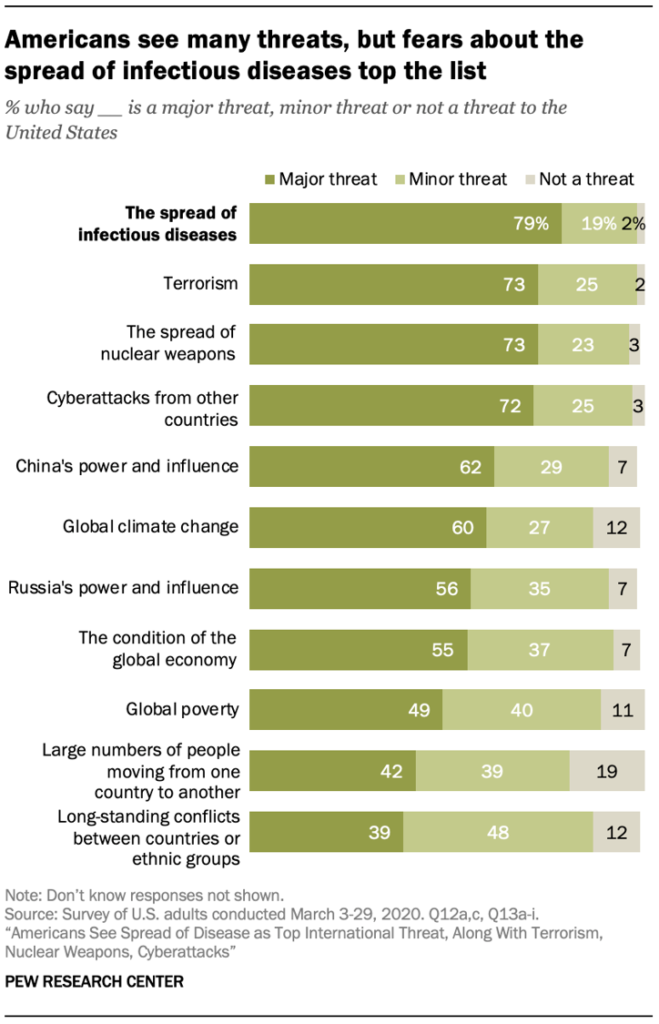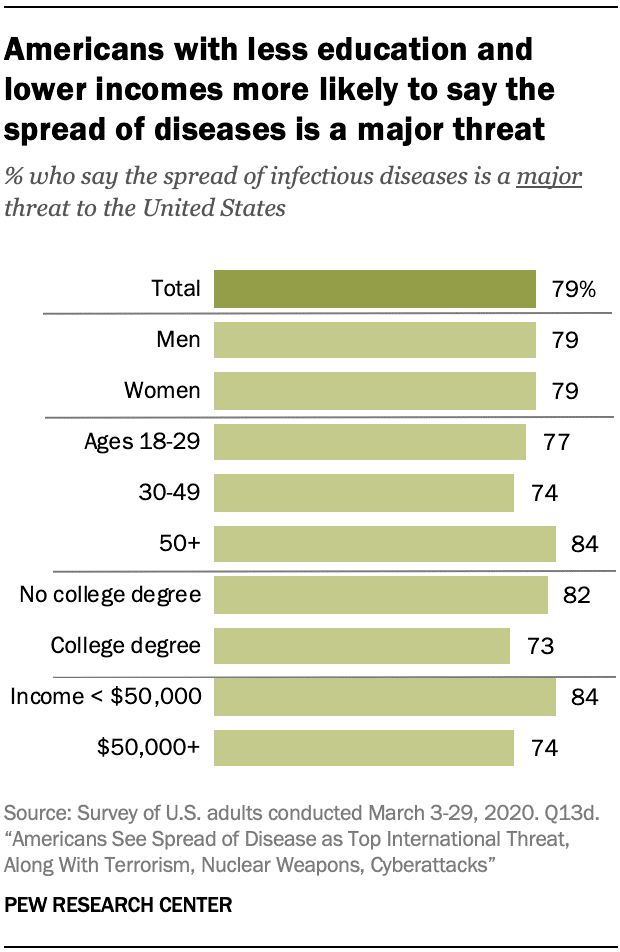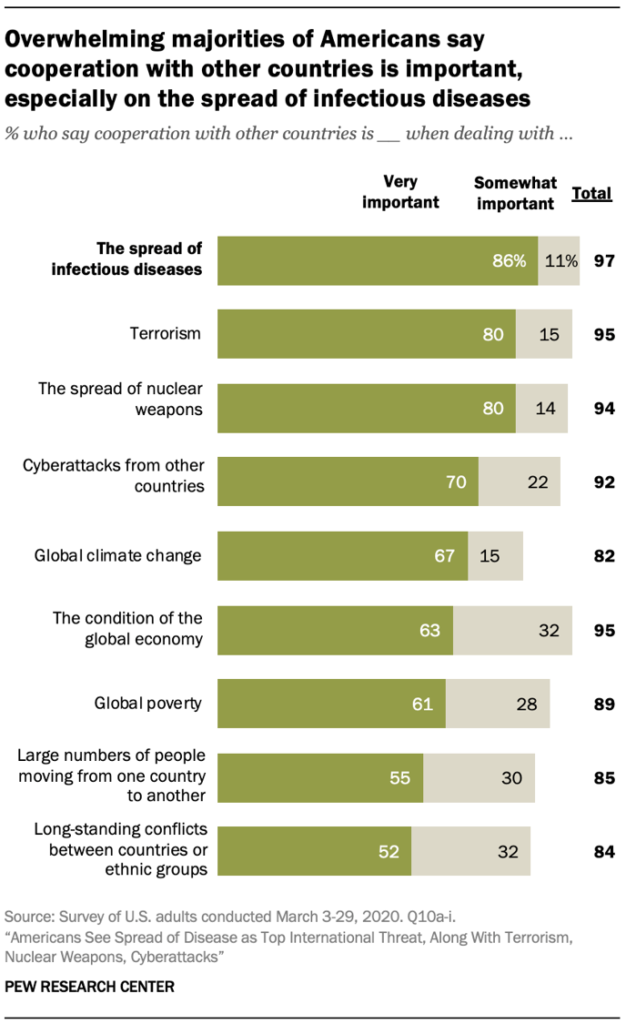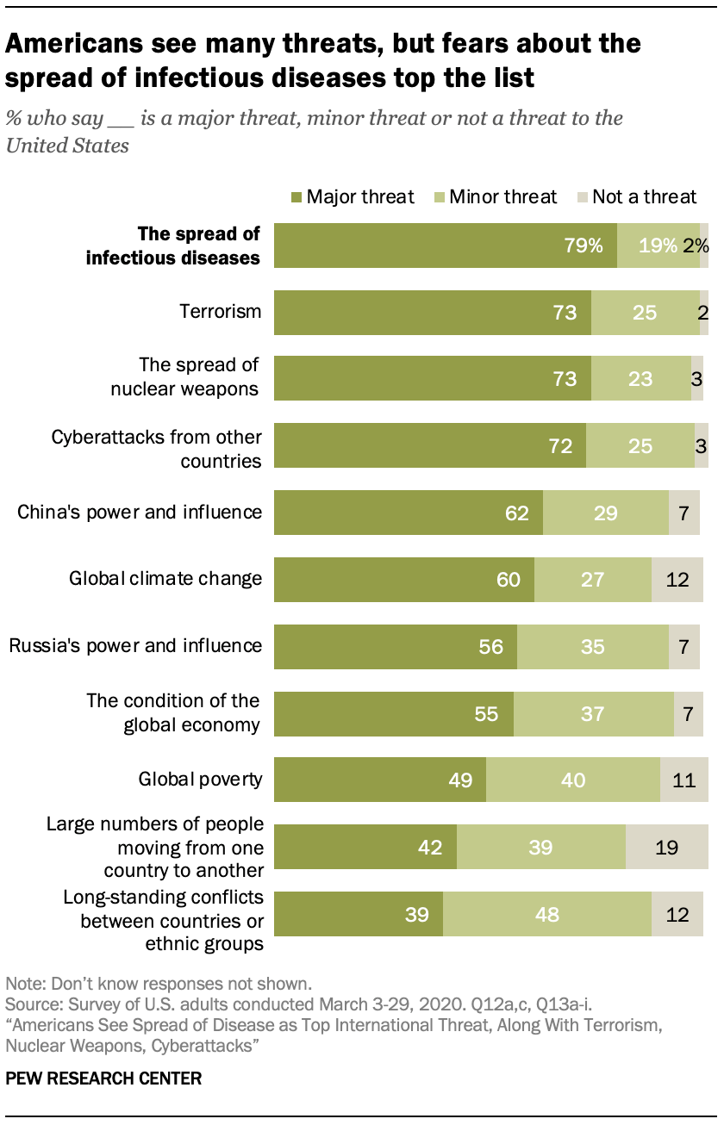 The spread of infectious disease is the new terrorism in the eyes of Americans.
The spread of infectious disease is the new terrorism in the eyes of Americans.
The most significant major threat to the U.S. is infectious disease, four in five Americans said in March 2020, closely followed by terrorism (in general), the spread of nuclear weapons, and cyberattacks from other countries.
For the study, the Pew Research Center commissioned a telephone survey conducted among 1,000 U.S. adults in March 2020.
Large majorities of people are also highly concerned about China’s growing power and influence, global climate change, Russia’s power and influence, the condition of the global economy, and global poverty.
The percent of Americans worried about the threat of infectious disease grew fast from 2016, with 52% of people seeing the major threat in Pew’s survey that year, to 79% in March 2020.
The two other steep growth curves of concern in the past few years are seen in Americans’ worry about China’s power and influence and the conditions of the global economy, with Russia’s power and influence another sharp up-tick in recent years.
More older people 80 years old and up (84%) are most likely to see the spread of infectious disease as a major threat. That isn’t to say that younger people 18-29 don’t see the threat of infectious disease, as Pew found that 77% of this youngest cohort saw a major threat in the COVID-19 pandemic.

The biggest difference across the ages in terms of seeing major threats was for immigration, with a delta of 28 percentage points: 50% of the oldest Americans saw “large numbers of people moving from one country to another” as a major threat, while only 22% of people 18-29 see global migration as a major threat.
In addition to age differences, Pew found that more people with less education saw infectious disease spread as a major threat the U.S., the second chart shows. The perceived major threat of the spread of infectious disease is, unsurprisingly, also great among people earning less money (84%, under $50K) compared with people earning over $50K (74%).
[We now know that socioeconomic status and health disparities play a role in greater risk for succumbing to COVID-19, which I addressed here in Health Populi.]
Partisan differences on the issue of seeing the spread of infectious disease as a major threat are relatively small between Democrats and Republicans, where 82% of Dems/Leaning Dem see a major threat, compared with 77% of Republican/leaning GOP.
There are also small differences across party ID for perceived major threat on the spread of nuclear weapons, cyberattacks from other countries, China’s power and influence, and terrorism in general.
However, there are large partisan chasms when it comes to global climate change, global immigration, Russia’s power and influence, and global poverty.
 Health Populi’s Hot Points: Most Americans (86%)say global cooperation is “very important” when dealing with the spread of infectious disease — above all other threats the U.S. was facing in March 2020, including terrorism, the spread of nuclear weapons, and cyberattacks from other countries. There’s a total of 97%, virtually unanimous agreement, among Americans saying it’s important (very or somewhat) to engage in global cooperation to deal with the spread of infectious disease.
Health Populi’s Hot Points: Most Americans (86%)say global cooperation is “very important” when dealing with the spread of infectious disease — above all other threats the U.S. was facing in March 2020, including terrorism, the spread of nuclear weapons, and cyberattacks from other countries. There’s a total of 97%, virtually unanimous agreement, among Americans saying it’s important (very or somewhat) to engage in global cooperation to deal with the spread of infectious disease.
Most Americans also see two global economic issues as threats: the state of the global economy and global poverty. For these issues, too, most Americans say cooperation with other countries is important — in total, 95% of all U.S. adults for the condition of the global economy, and 89% regarding the state of global poverty.
Globalization is a fact of life, both for the economy (personal/household and macro for the nation) and for health — esp. when we consider the nature of viruses and infectious diseases.
Our economies are intimately linked to our health and the importance of the resilience of national health care systems. That’s why a recurring message at last week’s meeting of the International Monetary Fund, which convened virtually with sessions broadcast the world over, from Europe to Asia to North America, South America and Africa — the theme of bolstering the health of health systems in every nation resonated in many sessions, even those that weren’t discussing “health care.”
The coronavirus pandemic has raised the issue of healthy bodies and citizens, productivity, and healthy economies.
As the U.S. continues to consider and evolve its role in the global economy, it’s key to bake into that thinking and strategizing the strength of the American healthcare system. COVID-19 has revealed deep cracks in the foundations therein. We can and must do better, and the Pew study shows most Americans (not all, to be sure) are leaning about this relationship first-hand as we #StayHome to #FlattenTheCurve, increasingly worried about the threat of the spread of disease.





 Thank you FeedSpot for
Thank you FeedSpot for